On my team, we usually do string concatentation like this:
var url = // some dynamically generated URL
var sb = new StringBuffer();
sb.append("<a href='").append(url).append("'>click here</a>");
Obviously the following is much more readable:
var url = // some dynamically generated URL
var sb = "<a href='" + url + "'>click here</a>";
But the JS experts claim that the + operator is less performant than StringBuffer.append(). Is this really true?
